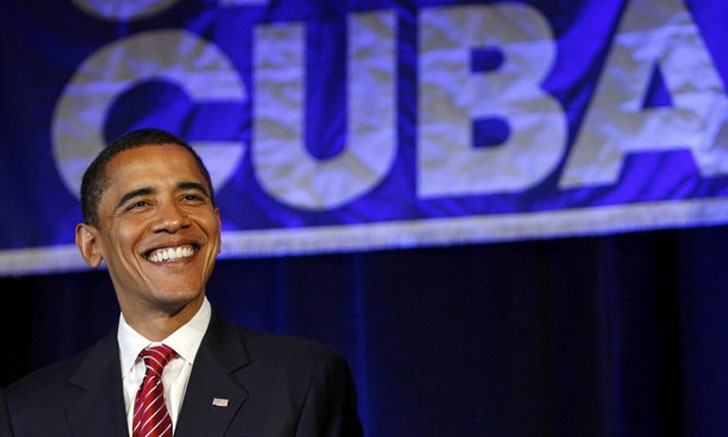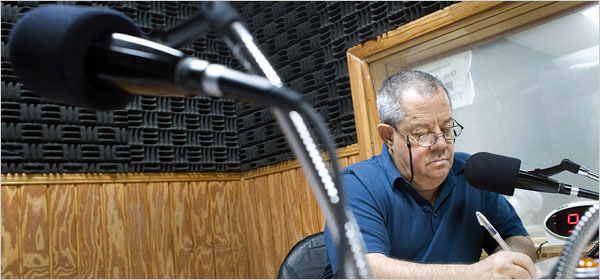
Aruca was right and they were wrong
El Nuevo Herald published an interesting column recently written by Jorge Dávila Miguel, titled “Fuerza Aérea Uno” ( Air Force One in English), about next week’s visit by President Obama to Cuba. We’ve decided to translate it to English. I’ve added a few facts in this preface that lend greater credence to Dávila Miguel’s words.
First, let us admit that the column in question would not have been published 20 years ago in El Nuevo Herald. For that matter it would not have been published 10 years ago. The Miami Herald would not have had the courage to do so. And this last statement is not meant as a slight; it is a fact. Miami’s only daily newspaper has been behind the eight ball on Cuba since time everlasting. And even today, it continues the trend.
Most importantly, though, there are two points cited in the column that I feel are important to expound on. Dávila Miguel’s third to last paragraph refers to Progreso Weekly’s founder, Francisco Aruca, who preached rapprochement as the only solution long before it was popular. Aruca, as well as his family members and some close associates, paid dearly for his foresight, including a daily fear of a violent death. Bombs that blew out windows and doors in the business he founded, Marazul Charters, can attest to that. Interestingly, it was a business begun in 1979, by Aruca and others, to help foster the reunification of the Cuban family.
Still today, many in Miami have yet to admit that Aruca’s ideas and thoughts were exactly on point and ahead of their time. In other words, he was right and way too many were wrong!
Given great emphasis in Dávila Miguel’s column is the Jorge Mas Canosa story that the exile community’s leader would have gladly negotiated with Fidel Castro, if given the opportunity. I know for a fact that this is true. And any Progreso Weekly reader who’s been with us long enough may remember several articles written by me over the years where I tell the story of an early evening meeting that occurred in 1992, between Jorge Mas Canosa, my deceased father, Angel Fernandez Varela, and a third individual who still lives in Miami, a close friend and associate of Mas Canosa.
Already then, when Mas Canosa reiterated that there could never be negotiations with the Castro brothers, he was looking for avenues in order to speak to Fidel. Of course, Fidel had no interest in conversing with Mas Canosa. I know this because the message was sent (and received) and there was never an answer.
Mas Canosa, as has been the case with many Cuban exiles over almost six decades now, considered himself more important than he was. And Castro, no slouch when it comes to the chessboard of politics, knew that if there was to be negotiations, a U.S. president had to be involved.
What follow are the words written by Jorge Dávila Miguel. I felt this preface was important. One reads that history is written by the victors. And in our case, we write these words to honor the too often unappreciated victories of persons like Francisco Aruca.
Alvaro Fernandez, Editor – Progreso Weekly
*****

AIR FORCE ONE
El Nuevo Herald 03/11/16–– Jorge Dávila Miguel
Jorge Mas Canosa would have been in that plane. With President Barack Obama will travel to Havana a dozen Cuban-Americans to witness and support what undoubtedly will be history.
Mas Canosa told me so in his office. It was the day that Carlos Alberto Montaner announced that his Democratic Platform was willing to “dialogue to find a democratic solution” with the Cuban government, through his Silver Bridge theory.
Look what Montaner has done to me! exclaimed Mas, half alarmed, half upset. “And what’s the big problem?” I replied, maintaining the tone, though unable to understand the fuss. Then he answered: They don’t want to talk with us; because if they did, I’d be the first to board the plane. Carlos got ahead of me.
Jorge Mas’ public political stance was total opposition to a “dialogue.” Perhaps it was because he knew two things: that Havana’s logical interlocutor would always be Washington and that his opportunity was in being intransigent with Havana and chummy with Washington. If he couldn’t be an interlocutor, maybe he could be the interpreter. Mas was crudely practical.
Just as likely, he would have celebrated an invasion. Some of his then-closest collaborators will know exactly what I’m talking about. And, for the record, Jorge Mas also told me — another day — that “even if Fidel Castro fell tomorrow,” the Cuban Adjustment Act would have to be maintained “a few years more,” so as to have greater political power also in Miami. Jorge was a man with spunk; what happened was that the men down there had more.
Meanwhile, our Cuban-American politicians are going through contortions to adjust the Adjustment Act so that “those Cubans,” those different Cubans who arrive nowadays will not tarnish their Camelot-in-exile. Actually, they do know that their Cuban electorate is changing and that they have neither the guts nor the neurons to understand it.
It’s not that the new migrants are “Castroites;” it’s that they’re not prisoners of that outdated rhetoric that kept the politicians in their elected posts via the bitter theory of the guava pastry and the “Viva Cuba libre!”
And that same rhetoric, healthily amplified by the Miami media, says that the Cubans who travel with Obama are going “after money.” In search of business.
As if that were a label that would be rejected by any of those being insulted. But they’re wrong: those who travel with Obama have a seat because they go “with” money. And also because they decided, like others who don’t have it, to look fearlessly into the face of reality and attempt to influence the health and future of the Cuban nation. And if they carry a few pesos more … or less … what’s the problem?
A new era opens between Cuba and the United States in which their respective leaders perhaps will allow the island to slide toward the changes “on a soft inclined plane,” as Norberto Fuentes told me.
But also another era opens in Miami for the Cuban-American political class, if the machinery and the drive that some politicians had until now can be reinvented for others in the face of new realities: the normalization of relations, the development of commerce between Miami and Havana, and the political complexity of Cubans who reside simultaneously in both cities.
Over there, with a deputy in the Cuban government; here, with a Congressman in the U.S. government. The laws already permit it.
I remember how Francisco Aruca predicted it, repeatedly, 20 years ago, and how I — full of certainty — mocked him. But it’s coming.
Normalization. Minus the joke about a President Marco Rubio.
Whatever the result of the 2016 elections, the embargo will end. The next president will only influence whether it ends sooner or later. All who bet on what today is Obama’s policy and mutual understanding deserve a seat in that plane. That’s how they will travel now, not as interlocutors but as guests.
But they will finally be there, looking at “Castroism,” even if sideways. Republicans Carlos Gutiérrez and Mike Fernández come to mind, among others, and there will be no shortage of illustrious Democrats.
Most of us will watch everything on television. An enviable opportunity: to witness history in real time.
Jorge Dávila Miguel is a political commentator and a columnist for CNN en Español.

